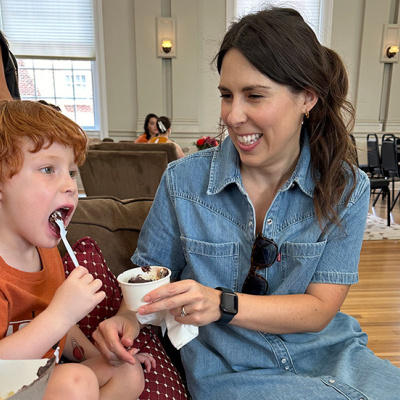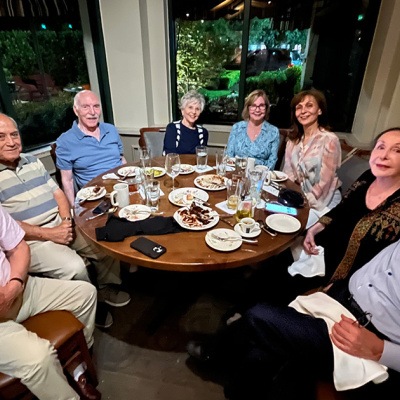Rising Literary Stars Lara Prescott and Maya Perez Compare Notes on Their Careers

Lara Prescott is barely a year out of her MFA program at UT’s Michener Center for Writers, but her debut novel, The Secrets We Kept, is already in its third printing, will be translated into 29 languages, and sat on the New York Times bestseller list for five weeks. After 14 publishers bid on the manuscript in the U.S.—a sprawling, meaty, completely captivating novel based on the true story of how the CIA smuggled Doctor Zhivago into Soviet Russia, starring masterfully crafted characters that include brilliant secretaries (and secretaries turned spies)—Knopf bought it at auction for around $2 million. Actress Reese Witherspoon selected it for her book club, and Prescott has sold both the film and TV rights.
The ensuing book tour has already taken Prescott, MFA ’18, to more than 25 cities and two countries. She’s on a rare several-day stint at home in Austin between the Texas Book Festival and a flight to Italy when I catch up with her on a Friday evening this past October. Her success is the publishing world equivalent of a rookie quarterback winning the Super Bowl, and yet Prescott seems, for the most part, firmly grounded in the world of “normal” writers. At the very least, the 38-year-old has not forgotten one of the most important lessons any UT graduate student can learn. “You’ve never been to Texas French Bread?” she asks Maya Perez incredulously as the three of us get settled for dinner. “They have the most amazing happy hour. But the best thing about this place, I can’t remember which night, but one of them, if you’re the last person here, they give the bread away!”
Luckily, Perez, MFA ’15, hasn’t totally missed her chance to take advantage of a West Campus happy hour—the 48-year-old writer and producer is a newly named visiting faculty member at the Michener Center. Perez, named one of Austin Film Festival’s “25 Screenwriters to Watch” in 2016, has co-edited three collections of interviews between screenwriters and filmmakers, and is the executive producer of On Story, a television series that explores the creative process of film-making; Season 10 premieres this April on PBS.
Over wine, the pair, who just barely missed each other as classmates but have developed a warm rapport since, discussed storytelling, how they define success, and whether, as Prescott’s book claims, “art can truly change the world.”
The following are edited and condensed excerpts from our conversation.
ALCALDE: Neither of you set off from undergrad to immediately pursue an MFA—you both had “old” jobs before becoming writers. When and why did you decide to say “OK, I’m gonna give this a try?”
PEREZ: I used to live in New York. I was a literary agent. And I was just wanting a different quality of life. I felt like the whole reason I wanted to be a literary agent was this fantasy of what a literary agent did, which was you know, lots of martini lunches, but also just discovering little gems and helping them find homes. And now I know that there are agencies that operate in that way, but all the ones that I knew were the big ones, who wanted commercial books. So I moved to Austin, and I worked at Austin Film Fest as a conference director for 10 years, met my husband, had our baby, and a year later I left my job and we went traveling around Southeast Asia for a year. And that was when I finally started writing.
ALCALDE: Wait—you started writing when you were traveling around Southeast Asia with a one-year-old?
PRESCOTT: Wow.
PEREZ: I think I finally felt free. I always felt like my career was at the front, and my career was always everybody else’s writing. Editing, pairing people together, I don’t know, just helping to launch everybody else’s career. And I would have ideas for stories, but honestly was too scared to even jot them down like, on a scrap paper.
ALCALDE: I think sometimes our first instinct early in our careers, especially as women, is to say, “Let me help other people do this thing that I really enjoy.”
PEREZ: Right, because I’m probably not qualified or good enough.
PRESCOTT: Exactly. Imposter syndrome. Right now I’m writing a letter to myself as a young woman for an Italian magazine.
ALCALDE: What are you going to say?
PRESCOTT: In my old job, [as a political campaign consultant] I had this feeling that I had to be quiet. You tell yourself that these people are some great know-it-alls. But in reality, they probably don’t know as much as you think they do. I would tell myself: You’re better than you think you are.
ALCALDE: You were living in D.C., working on these huge campaigns. Was it hard to leave that life, even if it was “quieting” you?
PRESCOTT: I was making double the money of my partner. I was who my parents would brag about. The people I was working with ended up at the White House, or working on Obama’s second term. That’s the path I was on, and I would have stuck with it. But I hated it so much. My husband said, “What would you do, if you could do anything?” and I said, “Write a novel.” He said, “Do it.” It took years before I even made it to Michener. I was terrible then. But even my mom told me, “do it.” I was so shocked that my mom was like, “Do this thing you will probably never be successful at.”
PEREZ: This is amazing. This is exactly what was happening for me before I started writing. I was flying first class, I had an assistant, I was good at it. But I was like, “Oh my God, I hate this.” I told my mom, “I know this sounds insane, but I really want to quit this job and travel around Southeast Asia.” And she was like, “OK.”
ALCALDE: Can we just do a quick toast to moms? Both of your decisions were, at least partly, about separating money and success. Or at least realizing that one doesn’t always inform the other in the ways we might think. How do you define success now?
PRESCOTT: My cousin is a single mom with two young kids. She has one vacation a year and she reads one book on that vacation. She works so hard, and this is her escape. I would love to be the author of that book. When someone comes up to you and says, “This book moved me, and here’s why,” that’s the only success that matters.
PEREZ: I don’t want to write movies that people feel like are “important” movies that they should see, the kind of movies you think, “Oh, I should see that” and then it stays in your queue forever.
PRESCOTT: The best work is when you get the underlying social message, and you’re also entertained.
PEREZ: Primarily entertained!
PRESCOTT: Exactly. That’s the magic.
PEREZ: You have to be writing first for yourself, and then wanting it to connect with other people.
ALCALDE: It’s hard to write for yourself when you don’t know who you are. I’m now in my 30s and just starting to figure that out.
PEREZ: Yeah, I no longer feel like I want to write like Zadie Smith.
PRESCOTT: You’re not imitating someone else. That’s what connects with people! If you are writing to figure out these questions you have for yourself, if you’re real about it, that’s going to connect. That’s like the only thing that you know.
ALCALDE: How do you know what thoughts or questions are worth pursuing?
PEREZ: First I think, “Is this an idea? Or is this a story?”
PRESCOTT: The difference, to me, is that a story has heart to it. It has character. It lives in a real world of its own.
PEREZ: And an idea is like a little blurb. Or it’s almost, I don’t know, a meme, or a gif, or a TikTok. You’re like, “Oh my God, this is so funny,” but it doesn’t have the legs to enter a journey.
PRESCOTT: The journey for me is important for the kind of book I like to read, and the kind I like to write. I want things to be happening. Going to Michener and having screenwriting as my secondary really helped me think about how I could get a feeling or a result to happen without being in my characters head the whole time.
ALCALDE: Everyone says that about the Michener program, that studying alongside writers of different genres elevates their writing so much.
PEREZ: It does, and teaching the first-year seminar—twelve fellows, a mix of poets, fiction writers, screenwriters, and playwrights—is truly a dream job. I would love to do this for the rest of my life. Maybe I’m not quite matching the image in my mind from when I was younger of what I’d be doing, but I also didn’t even know really how to do that. I didn’t know about any of these jobs that are available now.
PRESCOTT: I love that class. It’s where everyone gets to experiment. It’s about being open to failure, and experimenting and being positive about it.
PEREZ: It’s funny, we actually talk about what “success” is a lot in my class. I want my students to be thinking about it all the time. I tell them, “You might have how you think you define success, maybe you’ve been programmed by media and society to think that success is like, selling your script. But stop and think about you. Is success having your play produced? Is it critical acclaim? Commercial success? Is it being so successful everyone from your past who were haters gets to finally see that you were something and you weren’t a failure?”
ALCALDE: I know that last one isn’t the right answer but also like, yes?
PRESCOTT: Right! But you’ll never know if they know. Like . . . does my ex-boyfriend know? [Laughs.] I saw an author recently post a photo of a stack of all his books. Maybe that’s the real measure of success. Once I get beyond that first book, even the second, how can I have a stack of books when I’m 80 years old? That’s what I want. The immediate goal? Put out something better.
Photograph by Phil Kline






